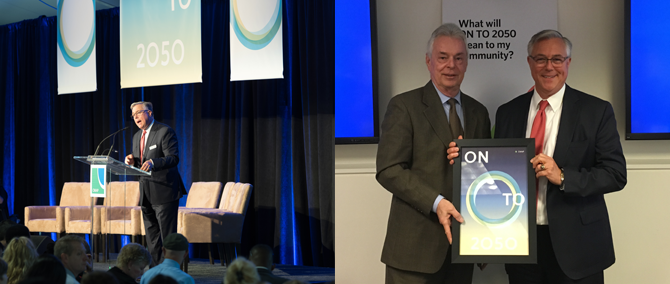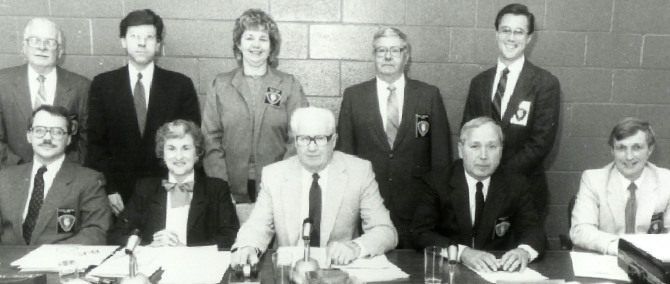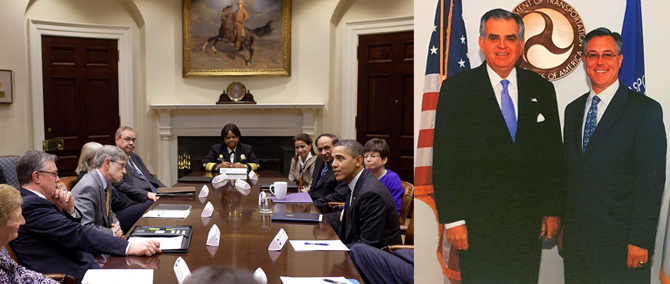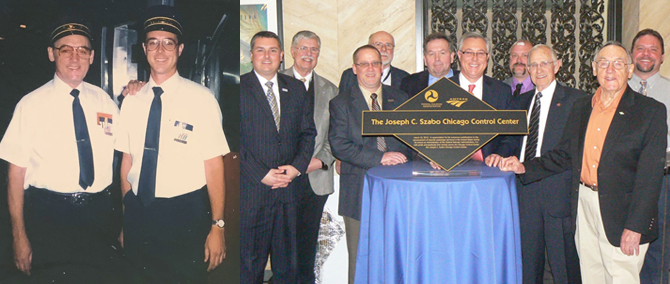After a 40-year career driven by self-described “dual passions for transportation and public service,” Joseph C. Szabo is retiring—and, he said, his 2015-2019 tenure as executive director of the Chicago Metropolitan Agency for Planning (CMAP) completed his professional “round trip.”
“During my career I’ve had the pleasure of serving the public at the local, regional, state, and federal levels,” said Szabo. “Ending my career at CMAP brought all of those experiences full circle for me as we developed and began implementing ON T0 2050—a plan that fulfills state and federal mandates, advances regional priorities, and helps our region’s 284 communities prosper.”
As CMAP’s second executive director, Szabo guided the three-year development of ON TO 2050, northeastern Illinois’ long-range comprehensive plan, adopted on October 10, 2018. The agency engaged more than 100,000 residents in development of the plan, an effort Szabo credits to the entire agency driven by his strong belief in civic participation.

Szabo learned that value from his father, a railroad switchman, and his mother, who ran a beauty shop—as well as from his native south suburban Riverdale, Ill. “That’s the kind of community Riverdale was, and is—a community of volunteers with a very, very strong social fabric,” said Szabo.
As a teenager, Szabo and his friends honed their leadership chops by coaching his younger brother’s Little League team, and serving the local Jaycees chapter. By the time he was 20, he said, his friends started calling him “the Mayor--” a nickname that would later become an official title.
At age 22, Szabo followed in his father’s footsteps to serve on the village’s Zoning Board of Appeals/Plan Commission. It would be the launching point for a series of successfully greater leadership roles in his hometown, including Park Board member, Village Board member, and in 1997 at age 39, Mayor.

“Being able to make a difference in the place where you grew up is a very, very special feeling,” said Szabo.
During his term as mayor, then-Chicago Mayor Richard M. Daley formed the Metropolitan Mayors Caucus in 1997 to promote the idea of regionalism. For the first time, the region’s 280-plus mayors would have a forum for collaborating on common problems and working toward shared goals on behalf of the region’s residents. Szabo was one of the founding mayors of the Caucus. He was also appointed to serve on the Executive Council of Chicago Metropolis 2020, a civic organization that helped advance the idea of merging the Chicago Area Transportation Study and Northeastern Illinois Planning Commission to create CMAP.
“The Caucus built trust with and between local leaders and ensured a forum for the mayors, without which CMAP could not exist as it does today,” said Szabo. ““The whole concept that the Caucus, Metropolis 2020, and others at the time promoted—that we are stronger together—has always been a simple one for me to embrace.”
Szabo balanced his public service with his academic pursuits and a 20-year career on the railroad. Szabo that even though his father was a 40-year railroad worker and railroading traced back to his great-great grandfather on his mother’s side, he never intended to become the fifth generation of his family to work on the rails. However, he quickly “fell in love with the railroad” after taking a job right out of high school on the Illinois Central (later the Metra Electric), working freight and commuter service to pay for his classes at Thornton Community College.
“I’ve always loved the camaraderie of railroading—the long hours, working in all types of weather,” he said. “It’s a special culture; your coworkers are like family, and particularly in freight, it’s a dangerous environment. You look out for each other.”
Szabo would work on the railroad from 1976 until 1996, just before being elected Mayor. He also helped lead the railroad’s union, and simultaneously “chipped away” at his studies to earn a Bachelor of Arts in Business Administration from Governors State University. Later, he would receive an honorary doctorate from Lewis University for his lifetime commitment to public service.
Szabo knew firsthand what freight and commuter rail meant to his town. In his 40 years as a resident of Riverdale, Szabo himself always lived within two blocks of the station. And as Mayor he dealt with the challenges of five freight lines criss-crossing through town and two major freight yards. These perspectives would inform Szabo’s role as state legislative director for the United Transportation Union, where he came to work closely with then-Illinois Sen. Barack Obama on rail issues. During that time, he was also assigned to serve the nation on the Rail Safety Advisory Committee, dedicated to protecting the safety of rail passengers, workers, and the public.
Ultimately, President Obama would tap Szabo as the twelfth administrator of the Federal Railroad Administration (FRA), part of the U.S. Department of Transportation. Szabo reflects that as a fifth generation railroader, and the first FRA head to come from the ranks of rail workers, it was an honor to “take care of the family business, so to speak” for six years.

“An important element that I brought to the table was an understanding of the impacts, both the good and the bad, that a railroad has on a community,” said Szabo.
While at the FRA, Szabo said, CMAP was held in the highest regard as one of the nation’s leading Metropolitan Planning Organization. When founding CMAP Executive Director Randy Blankenhorn was tapped by Gov. Bruce Rauner to lead the Illinois Department of Transportation, Szabo was selected to “come home” to serve the region at CMAP’s helm.
In addition to leading the agency during the development of ON TO 2050, Szabo said one of his proudest moments was helping to secure federal and state funding awarded in June 2018 for the first half of the 75th Street Corridor Improvement Project. The largest and most complex remaining project in the Chicago Region Environmental and Transportation Efficiency Program, the 75th Street CIP will untangle rail and traffic gridlock at a major freight-vehicle intersection on Chicago’s South Side.
As for retirement plans, Szabo is looking forward to spending more time with his 92-year old father, as well as traveling and volunteering. On his docket in the coming months: a trip to Vietnam, and a service trip to Cuba with Global Volunteers.

“It’s been an honor to work with this dedicated staff in serving the region and continuing to develop CMAP into the agency that the region envisioned more than 20 years ago,” said Szabo. “I encourage the staff to continue to embrace and plan for change—which, as planners know perhaps better than most, is inevitable.”